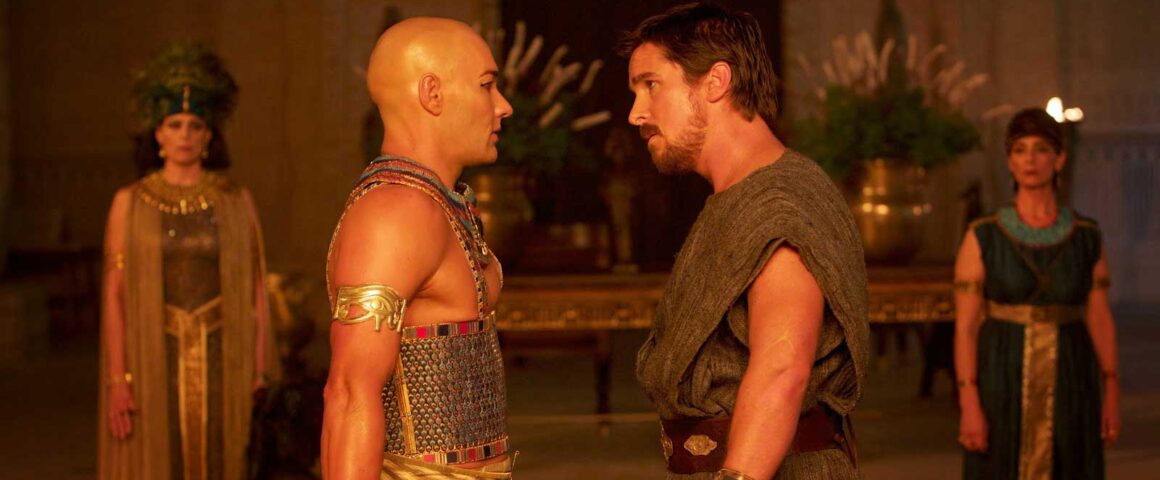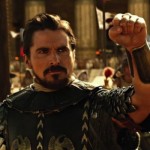Ridley Scott’s Exodus: Gods and Kings may be light on characterization and depth, but it is abundant in atmosphere and scene-to-scene, gripping drama. It’s biblical by nature, and although it does not delve as far as some would like into the lives of Moses or Ramses II, it is well-intentioned, thought-provoking and flashy. The CGI, though pervasive, bears the weight of this film, for the rogue waves and the swarms of locusts would not have been possible without the help of some technological support. It instills a message of perseverance and faith (even for the moderately religious) and it is touching to see that Scott dedicated the project to his brother who was lost in 2012 to suicide.
It is powered by forceful leads from Christian Bale (“Out of the Furnace”) and Joel Edgerton (“The Great Gatsby”) and although the two are, or become, polar opposites, their screen presence is palpable and it’s a pleasure to see them act out their craft on screen alone or together at odds. Ben Kingsley (“Ender’s Game”) as Nun and Aaron Paul (“Need for Speed”) as Joshua are also important adding well-intentioned support, while it’s quite amusing to glimpse John Turturro (“Transformers: Dark of the Moon”) as a made-up Egyptian pharaoh. Still, this capable cast aside, the film’s weaknesses in depth and its reliance on setting (versus narrative) hold Exodus: Gods and Kings back from being a ubiquitous historical epic film.
The narrative attempts to chronicle the life of Moses, beginning in the reign of the pharaoh Seti I (Turturro) following the attack on the Hittite army. After successfully returning to Memphis (in Lower Egypt that is), the pharaoh discloses his faithful trust in Moses as a leader; he goes as far as to say that he’d rather see Moses on the throne instead of his own son, Ramses (Edgerton).
Seti tasks Ramses with following up on the obscene spending that the Viceroy Hegep (Ben Mendelsohn, (“The Place Beyond the Pines”) is indulging in, but the Prince feels it beneath him. Instead, Moses takes on the task and heads to Pithom. There he is secretly invited into the home of Nun, one of the Hebrew slaves who shares with Moses a prophecy about a leader bound to help rescue them. Nun also says that Moses in fact the son of Hebrew slaves who was cast down the Nile in order to survive, and picked up by a high-ranking Egyptian. The rumor of Moses’ origins quickly spreads, and winds up at the ear of the new pharaoh (Seti has succumbed to illness), Ramses, who decides to exile the boy he grew up with.
Flash nine years forward, and after a marriage to Zipporah (María Valverde, “The Mule”) and a peculiar incident with (a young, grumpy) God, Moses is sent back to rescue the Hebrews. He leaves his family and mounts a formidable attack against the pharaoh — but when it’s not enough, God decides to flex his muscles a bit.
It’s here with the plagues that Ridley Scott spent the lion’s share for Exodus: Gods and Kings. Scott and company deliver stellar visuals (they always do, “Gladiator,” “Black Hawk Down”) — rivers of blood, hordes of frogs, destructive storms are all depicted in grand fashion. As usual, the film is seen through the lens of what can be described as Scott’s customary gray filter, which seems to be a stamp on all of his historical projects. This bleak dreariness contrasted against ornate, impeccably dressed characters creates a vivid tapestry of images which can be helpful for readers of the Book of Exodus (and the Torah and Bible). Scenes on the Egyptian mountains leading up to the Red Sea, while chariots precariously whisk around tight turns, are compelling as well.
Whether the depiction is historically accurate or not, well, that is a question that should be left to someone with more knowledge on the subject than I. However, I do know that while Exodus: Gods and Kings drags on a bit too long and viewers don’t get the most exhaustive view of Moses and Ramses or their motivations, it is inspiring to see Moses defy all odds to represent the underprivileged and fight for equal rights. It is a timeless battle and one that is applicable to members of any generation.





'Movie Review: Exodus: Gods and Kings (2014)' have 7 comments
December 16, 2014 @ 8:22 pm loodfohun
Prince of Egypt. I recommend watch it.
December 16, 2014 @ 8:48 pm DanGodzilla
Someone is going to go to hell for depicting God as an angry, obnoxious child…
May 17, 2015 @ 8:22 pm Sick Boy
that “someone” would be the people who wrote “The Old Testament”
December 16, 2014 @ 10:13 pm jc1738
This is a case where the book is definitely better.
December 17, 2014 @ 1:18 am Mats Clem
Even The Ten Commandments is better!
December 16, 2014 @ 10:27 pm Iglue
Not the best biblical epic but its not so bad. The main characters could have used more development and most of the secondary characters could have been excised. The plagues were fun.
May 17, 2015 @ 8:50 pm Sick Boy
“Historical accuracy” is completely beside the point when it comes to the story of “Exodus”. The event, with or without miracles, never took place because there was at no point in Egypt’s history such a vast number of Israelis inhabiting it, neither as slaves nor as common subjects. The indirect evidence for this is the complete absence of Egyptian documents on 100+ thousand people leaving the country overnight. The Egypt owed its good organization to detailed chronicling of virtually everything, yet any word of such a loss to its economy is nowhere to be found.
It’s left to speculation which person (or group of persons) the Moses from the story is based on, but the story itself was written from scratch by Jewish clerics during Babylonian captivity under Nebuchadnezzar II. At the time there was an obvious political need to establish an inspirational figure like that, if you can call a psychopathic killer inspirational.